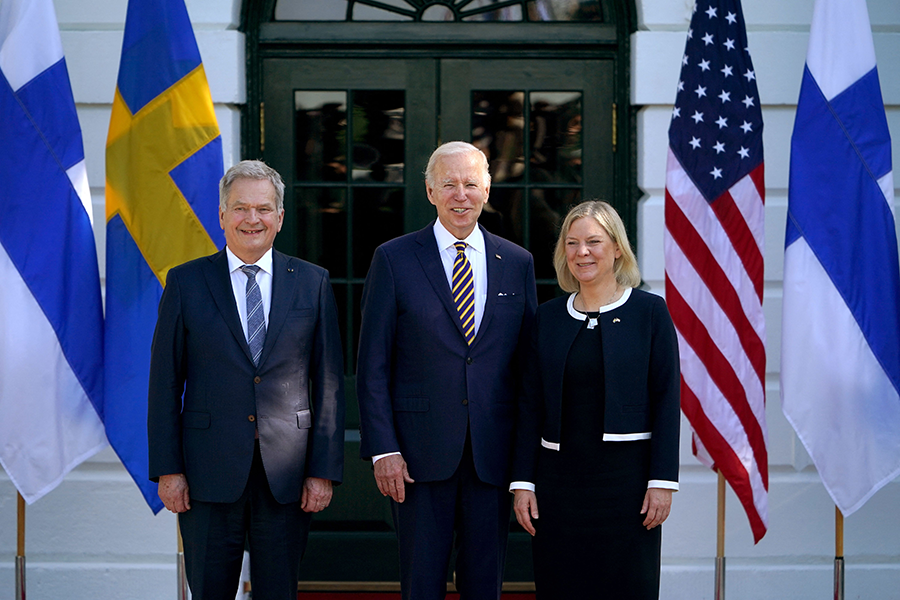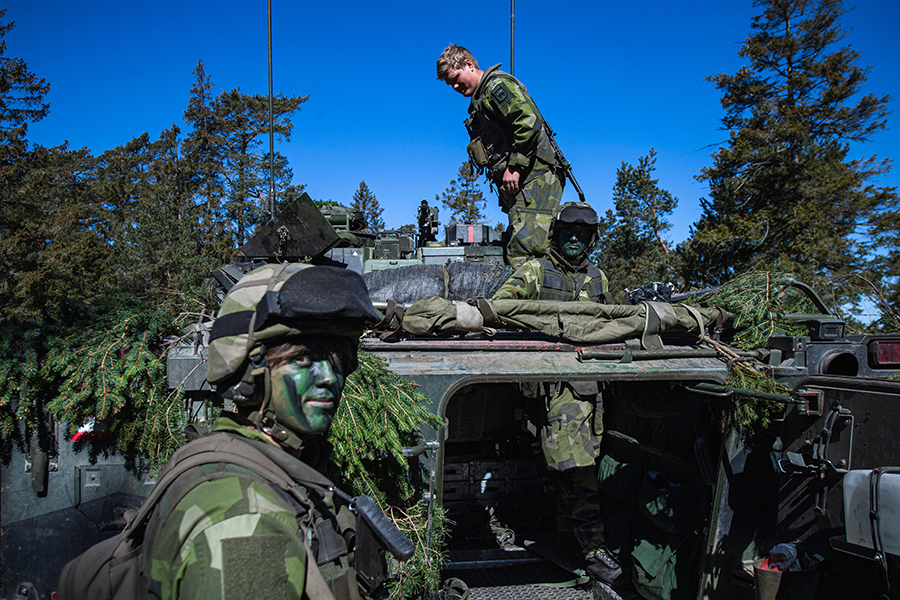"In my home there are few publications that we actually get hard copies of, but [Arms Control Today] is one and it's the only one my husband and I fight over who gets to read it first."
Finland, Sweden Apply to Join NATO
June 2022
By Gabriela Rosa Hernández
Finland and Sweden have applied to join NATO, abandoning their long-standing military neutrality in the face of Russia’s unprovoked war on Ukraine. The May 18 move signals an expected expansion of the alliance in ways that would have been unthinkable only a few months ago. It is widely seen as a political defeat for Russian President Vladimir Putin, who for years worked hard to tear the alliance apart and insisted that no new members be added.
 Sweden declared its intentions to seek NATO membership on May 15, shortly after Finland confirmed its move. Three days later, the countries filed formal applications at NATO headquarters in Brussels.
Sweden declared its intentions to seek NATO membership on May 15, shortly after Finland confirmed its move. Three days later, the countries filed formal applications at NATO headquarters in Brussels.
All of NATO’s 30 members must approve the new allies, a process that could take up to a year. In a surprise development, Hungary and Turkey, two NATO countries ruled by authoritarians, raised objections to the membership applications in what diplomatic sources described as an apparent attempt to gain political concessions driven by their national interests and desire to play to domestic audiences.
U.S. and European officials expressed confidence that any differences can be worked out. NATO Secretary-General Jens Stoltenberg said on May 15 that the membership process could be very quick, according to media reports, and U.S. officials acted as if it were a done deal. But the Hungarian and Turkish obstructions cast a cloud over the historic Nordic shift.
U.S. President Joe Biden moved to speed the process and reinforce a sense of acceptance by inviting Finnish President Sauli Niinisto and Swedish Prime Minister Magdalena Andersson to the White House on May 19. In a ceremony in the White House Rose Garden, he said he was submitting immediately to the Senate the treaty language needed to make the two countries the newest members of the alliance.
“Finland and Sweden make NATO stronger,” Biden said. “They’re strong, strong democracies, and a strong, united NATO is the foundation of America’s security.”
Biden warned Russia that the United States would “deter and confront any aggression while Finland and Sweden are in this accession process” before they formally are accepted into an alliance whose core commitment is that “an attack on one is an attack on all.” Although Biden’s pledge is far short of a treaty, U.S. National Security Adviser Jake Sullivan said on May 18 that the United States “will not tolerate any aggression against Finland or Sweden during this process.”
At the White House, Andersson said that “Russia’s full-scale aggression against a sovereign and democratic neighbor…was a watershed moment for Sweden, and my government has come to the conclusion that the security of the Swedish people will be best protected within the NATO alliance.”
 Finland and Sweden were nonaligned during the Cold War and maintained formal military neutrality even as their armed forces contributed to Western operations. Both countries are considered to be NATO’s closest geopolitical partners, possessing vibrant democracies, strong economies, and competent militaries. Since Russia invaded Ukraine and upended European stability, Finland and Sweden have become increasingly unsettled by the Russian threat and experienced a stunning surge in support among their politicians and publics to seek security in the alliance.
Finland and Sweden were nonaligned during the Cold War and maintained formal military neutrality even as their armed forces contributed to Western operations. Both countries are considered to be NATO’s closest geopolitical partners, possessing vibrant democracies, strong economies, and competent militaries. Since Russia invaded Ukraine and upended European stability, Finland and Sweden have become increasingly unsettled by the Russian threat and experienced a stunning surge in support among their politicians and publics to seek security in the alliance.
As late as March 8, two weeks after the invasion began, Andersson, Sweden’s Social Democratic leader, said that her party was opposed to joining NATO. Sweden consulted closely during the decision-making process with Finland, which led the way on the NATO issue.
“Military nonalignment has served Sweden well, but our conclusion is that it will not serve us equally well in the future,” Andersson told a press conference on May 15 in Stockholm in announcing her country’s NATO decision. “This is not a decision to be taken lightly.
Turkish President Recep Tayyip Erdoğan has said Turkey’s objection stems from opposition to Sweden’s and, to a lesser extent, Finland’s perceived support for the banned Kurdistan Workers’ Party, or PKK, and an armed group in Syria that Turkey sees as an extension of the PKK. Ankara’s conflict with the PKK, a Turkish separatist group, has killed tens of thousands of people since 1984.
Putin has long opposed NATO and before the invasion had demanded that the alliance cease adding new members.
Russia has responded to the Finnish and Swedish decisions by threatening retaliation, including unspecified “military-technical measures,” Reuters reported. Yet, Niniisto spoke to Putin on May 14 and said later that their conversation was measured and did not contain any threats. “He confirmed that he thinks [the decision to join NATO is] a mistake. We are not threatening you. Altogether, the discussion was very, could I say, calm and cool,” Niinisto said in an interview with CNN. The Kremlin described the exchange as frank and said the change of course in foreign policy could negatively affect Finnish-Russian relations.
On May 16, Putin said in his speech to the Collective Security Treaty Organization summit that the fact of Finland and Sweden becoming NATO members would not in itself be a direct threat to Russia, but the expansion of NATO’s military infrastructure to these countries would certainly provoke a response. Previously, Kremlin press secretary Dmitry Peskov told Kommersant that “the next expansion of NATO does not make our continent more stable and secure” and will require that Russia undertake a “special analysis and development of the necessary measures in order to balance the situation and ensure our security.”
